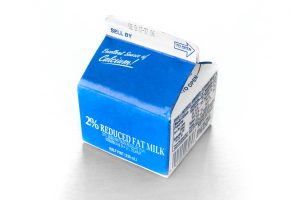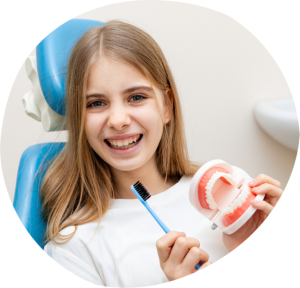Myths, Facts, and School Lunch Insights for Parents in Aventura and Pembroke Pines
As parents, we’re constantly bombarded with advice on what our kids should eat for strong teeth and optimal dental health. Cow’s milk often tops the list, touted as a dental superhero thanks to its calcium content and essential nutrients. But is milk really good for your child’s teeth, or is the hype overblown? At Dental Care Group Kids, serving families in Aventura and Pembroke Pines, FL, we see firsthand how nutrition impacts children’s oral health and want to provide evidence-based answers about dairy products and tooth decay prevention.
In this blog, we’ll explore milk’s role in school lunches, consumption patterns among kids, and the real science behind its benefits for baby and permanent teeth. Our pediatric dentists near you specialize in tailored care, from fluoride treatments and dental sealants to orthodontics that ensure proper alignment and bite, all in a fun, fear-free environment designed just for kids. Schedule a visit at our Aventura (305-935-2797) or Pembroke Pines (954-430-2300) location.
Milk in School Lunches: How Common Is It?
 Cow’s milk has been a staple in U.S. school lunches for decades, largely due to federal guidelines that make it a requirement for reimbursement. Schools participating in the National School Lunch Program must offer milk at every breakfast and lunch to qualify for funding from the USDA. This isn’t just a suggestion—it’s mandatory, with options limited to fat-free or low-fat (1%) varieties, including flavored milks like chocolate milk or strawberry to encourage consumption and reduce sugary drinks intake. Whole and 2% milk are currently not permitted in school meals, though there’s ongoing debate and legislation to expand choices.
Cow’s milk has been a staple in U.S. school lunches for decades, largely due to federal guidelines that make it a requirement for reimbursement. Schools participating in the National School Lunch Program must offer milk at every breakfast and lunch to qualify for funding from the USDA. This isn’t just a suggestion—it’s mandatory, with options limited to fat-free or low-fat (1%) varieties, including flavored milks like chocolate milk or strawberry to encourage consumption and reduce sugary drinks intake. Whole and 2% milk are currently not permitted in school meals, though there’s ongoing debate and legislation to expand choices.
This ubiquity stems from milk’s nutritional profile, providing essential nutrients like protein, vitamins, and calcium. Flavored milk dominates, making up most of what’s consumed in schools, with lower added sugar than store-bought alternatives. However, some schools require kids to take milk, even if they don’t drink it, leading to waste concerns. Recent updates to nutrition standards continue to emphasize milk’s role, ensuring it’s a daily fixture in cafeterias nationwide.
How Often Do Children Actually Consume Dairy from School Lunches?
While milk is widely available, consumption varies. Studies show that school meals contribute significantly to kids’ dairy intake, especially for low-income children aged five to 18, where 77% of daily milk and 70% of total dairy come from school programs. Children who eat school lunches have higher overall intakes of milk, fruits, and vegetables compared to non-participants.
School dairy helps bridge nutritional gaps, supporting growth and dental health while reducing reliance on sugary drinks that can cause tooth decay. However, not all kids finish their milk—factors like taste preferences, lactose intolerance, and time constraints play a role. Flavored milks like chocolate milk boost participation, with students choosing fat-free chocolate milk consuming more protein and key nutrients than those who avoid dairy products entirely.
Our team at Dental Care Group Kids monitors how diet affects young smiles through regular dental check-ups. We offer kid-friendly orthodontics to correct issues early, preventing future problems. If your child skips milk or has dental concerns, call us in Aventura (305-935-2797) or Pembroke Pines (954-430-2300) for personalized advice.
The Realities of Milk and Calcium
For Baby Teeth
Baby teeth, or primary teeth, are crucial placeholders for permanent ones, and milk provides targeted support for their development. Here’s a structured look at the main ways milk benefits these early smiles:
 Strengthens Enamel with Calcium and Phosphorus: Milk delivers bioavailable calcium and phosphorus that mineralize tooth enamel, making it more resistant to decay and erosion. This fortification helps baby teeth withstand the acids from everyday foods.
Strengthens Enamel with Calcium and Phosphorus: Milk delivers bioavailable calcium and phosphorus that mineralize tooth enamel, making it more resistant to decay and erosion. This fortification helps baby teeth withstand the acids from everyday foods.- Promotes Proper Eruption and Jaw Growth: Regular intake supports timely tooth emergence and healthy jawbone development in infants and toddlers. Without it, misalignment risks increase, potentially leading to orthodontic needs later.
- Forms a Protective Barrier: Proteins like casein in milk create a thin, acid-neutralizing film over teeth, reducing bacterial adhesion and cavity formation.
- Maintains Neutral Oral pH: Milk’s balanced pH helps prevent enamel demineralization overnight, keeping baby teeth stable.
- Reduces Gum Inflammation: Anti-inflammatory compounds in dairy soothe gums, minimizing swelling that could affect feeding and speech.
However, balance is key—pair milk with brushing to avoid any residue buildup. At Dental Care Group Kids, our dental sealants protect baby teeth from decay, complementing calcium’s effects.
For Permanent Teeth
As kids transition to permanent teeth around age six, milk continues to play a vital role in building lasting dental strength. Below is a breakdown of its specific contributions:
 Builds Durable Enamel and Dentin: Calcium from milk reinforces the harder, outer enamel and inner dentin layers, enhancing resistance to cracks and wear during growth.
Builds Durable Enamel and Dentin: Calcium from milk reinforces the harder, outer enamel and inner dentin layers, enhancing resistance to cracks and wear during growth.- Boosts Calcium Absorption with Vitamins: Vitamins D and K2 in milk improve how the body uses calcium, optimizing it for tooth and bone mineralization.
- Lowers Risk of Periodontal Disease: Dairy’s anti-inflammatory properties, combined with calcium, help prevent gum disease by supporting healthy tissue attachment.
- Supports Orthodontic Stability: For children in braces or aligners, milk aids in maintaining strong tooth foundations, reducing treatment complications.
- Prevents Erosion from Acids: The protective casein layer shields emerging permanent teeth from acidic foods and drinks common in school lunches.
For tweens and teens, this ongoing support leads to healthier adult dentition.
Tips for Incorporating Milk into Your Child’s Routine
- Pair school milk with balanced lunches for maximum absorption.
- Choose low-sugar flavored options to encourage drinking.
- Supplement with cheese or yogurt if milk intake is low.
- Monitor for allergies and opt for fortified non-dairy if needed.
Common Questions About Milk and Kids’ Dental Health
- Is milk better than water for teeth? Milk offers nutrients water doesn’t, but both are essential—milk for building, water for rinsing.
- What if my child is lactose intolerant? Fortified alternatives can provide calcium; we recommend consulting our team for supplements.
- Does chocolate milk harm teeth? In moderation, its benefits outweigh risks, but rinse with water after.
- How much milk daily for dental health? Aim for two to three servings; school lunch helps meet this.
Have more questions? Reach out to Dental Care Group Kids in Aventura (305-935-2797) or Pembroke Pines (954-430-2300).
Dairy and Dental Care: Your Child’s Path to a Happy Smile
In summary, milk is indeed beneficial for young teeth when part of a balanced diet, supporting both baby and permanent smiles through calcium and more. At Dental Care Group Kids, our dentists in Aventura and Pembroke Pines are here to guide your family. Schedule now by calling 305-935-2797 or 954-430-2300—healthy smiles start with us!

